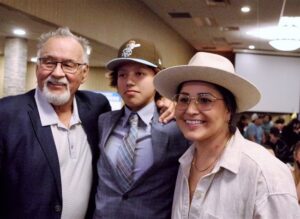Indigenous hockey players advocate for mental health and hope

By Rick Garrick
THUNDER BAY — Indigenous hockey players Reggie Leach and Brigette Lacquette recently spoke about making choices, having a voice, struggling with anxiety and mental health, and reaching out for help during the Tournament of Hope gala on May 20. The Tournament of Hope, which included hockey and broomball tournaments at the Fort William First Nation Arena and workshops and the gala at the Victoria Inn in Thunder Bay, was held May 15-20 with a focus on mental health and youth suicide awareness.
“I played pro for 14 years in the National Hockey League, I’m very proud of who I am, I’m very proud of my culture,” says Leach, Berens River citizen and first First Nation player to win the Stanley Cup in 1975 with the Philadelphia Flyers. “I live in Aundeck Omni Kaning … on Manitoulin Island now and since I came back, my whole life has been speaking to the youth about life choices. I made tons of bad choices as a youngster, as a 16-year-old or a 20-year-old, even into my thirties. It’s up to each and every one of you what choices you want to make.”
Leach adds that he is proud of his family, noting that his son played for Team Canada in 1989 at the World Juniors and his daughter played with Team Canada in 1991 in Women’s Lacrosse.
“Being First Nation, what a feeling — you should all be proud of who you are and where you come from, it doesn’t matter what community you are from, we’re all together, we’re all one,” Leach says. “When we work together, we can accomplish a lot. I’m a big believer in the Youth Council, I believe the youth should have a voice in their communities, but also be kind when you do have a voice.”
Lacquette, Cote citizen and the first First Nation player on Canada’s National Women’s Hockey Team where she won silver at the 2018 Winter Olympics in South Korea, says she has struggled with her mental health and anxiety throughout the course of her life.
“When I was younger, there was something about hockey that I just loved and what I loved about it was I was able to just go out, it didn’t matter if I had no friends, it didn’t matter if kids were saying things to me, I’d go out on that outdoor rink and just be by myself and stickhandle and shoot,” Lacquette says. “And that took all of my worries away, I was just focused on the task at hand.”
Lacquette says she found unhealthy ways to cope during her time on the National Women’s Hockey Team and her university studies, and she reached a low spot in 2021 when she was having a “really hard time.”
“I ended up reaching out to my family doctor — I just told her I feel like something’s off, like I don’t feel happy, like I should be happy but I don’t feel it deep down,” Lacquette says. “So I ended up asking for help and that was the first step and I’m thankful for that because I was able to build that courage to speak up and acknowledge my feelings and acknowledge that I didn’t want to go down this path.”
Lacquette says she went to see a psychiatrist at that time and was diagnosed with Attention-deficit/hyperactivity disorder (ADHD).
“It was one of the best decisions of my life because it completely turned my life around from where I was at to a complete 180,” Lacquette says. “And what helped me the most in those times was reaching out to the people I trusted.”


